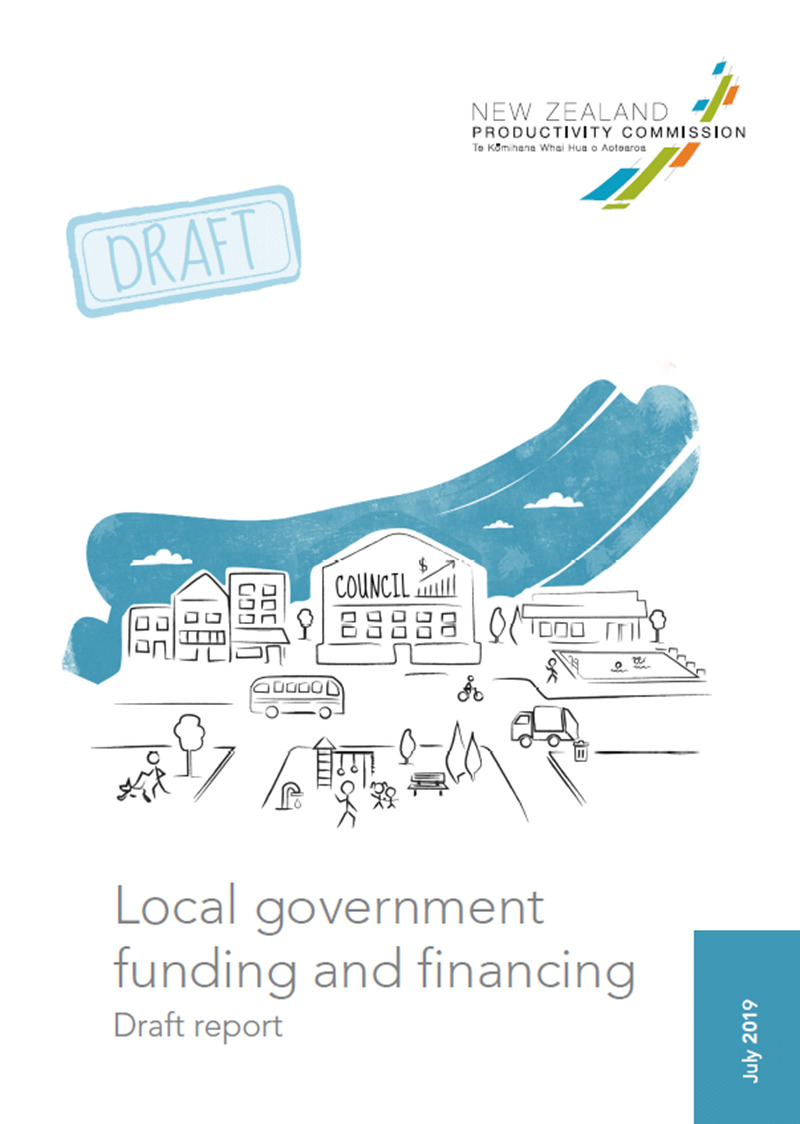The Productivity Commission, an independent Crown entity, has released its draft report on local government funding and financing following the Government’s request for the Commission to undertake an inquiry. The report runs to just under 300 pages, and includes useful context for the review, as well as high level analysis of trends in local government revenue, expenditures, prices and debt.
The three page terms of reference from the Ministers of Finance and Local Government to the Commission asked the inquiry to investigate cost pressures, funding and financing models and the regulatory system, and a follow up letter on 29 April 2019 specifically asked the Commission to consider whether a tax on vacant land would be a useful mechanism to improve the supply of available housing for New Zealanders.
The Commission’s findings
Local government
The Commission outlined that local governments play an important role in society by providing a range of essential services, and highlighted that the costs and pressures facing local governments have increased. The five largest sources of expenditure for councils were listed as being support services, roading, transportation, recreation and sport, and wastewater. The main sources of funding available to local authorities included rates, grants and subsidies, and sales and user charges.
Local authority rates increases have outpaced increases in other indices measuring average costs and incomes. Local authority debt has grown steadily since 2006, with some high growth councils coming close to covenanted debt limits. Therefore the Commission outlined key areas that the framework is not currently addressing.
Current framework
The Commission found that the current funding and financing framework is a good foundation for a future system. It supported the “benefit principle” whereby those who benefit from (or cause the need for) a service should pay for its costs, with scope to consider “ability to pay”.
The Commission called for better use to be made of existing tools, and suggested that councils require new funding tools, in particular to address:
• The infrastructure required to support rapid urban growth: currently the failure of high-growth councils to support housing development has created social and economic problems;
• Climate change: climate change poses a threat to local government infrastructure, and councils are responsible for local planning involving at-risk land;
• The growth of tourism: tourists are not paying the full cost of the demands they are placing on infrastructure (local roads, parking, public toilets, water and wastewater); and
• The accumulation of responsibilities placed on local government by central government: responsibilities are passed on to local government without adequate funding means.
Infrastructure
Regarding infrastructure the Commission has recommended a new “value capture” funding tool whereby property owners who enjoy windfall gains in their property value as a result of publicly funded infrastructure would be required to pay a portion of this gain to council, combined with volumetric wastewater charges and powers for councils to levy road congestion. It also recommended Special Purpose Vehicles to allow debt to sit off a council’s balance sheet if it was nearing its debt limits, so that it could continue to invest in development.
The Commission is considering a new funding stream from central government for new infrastructure as well as a possible tax on vacant land, and seeks submissions on these points in particular.
Climate change
The Commission stated that central government should provide high-quality and consistent science and data, standard setting, and legal and decision-making guidance regarding climate change. It stressed that the focus needs to shift from recovery following an event to reducing risk before an event occurs.
On this basis the Commission recommended that the New Zealand Transport Agency should co-fund local roads to assist councils facing significant threats to local roads and bridges. It also recommended the creation of a climate-resilience agency and associated fund to aid councils in planning for infrastructure threatened by climate change (through redesign, relocation, rebuilding).
Tourism
The Commission recommended that legislation should enable councils in tourist centres to implement an accommodation levy, and that greater use should be made of user pays for mixed use facilities. For smaller councils that could not reasonably use those options, the Commission recommended that funding should be given from the international visitor levy.
Resetting the relationship between central and local government
To allow co-design and joint implementation of appropriately funded regulatory regimes, the Commission recommended a “Partners in Regulation” protocol be developed by central and local government.
The Commission also referenced the need to revise a new three waters regime, given the high proportion of funds that local governments put towards this sector. The regime, the Commission says, should rigorously enforce minimum standards while giving councils the freedom to determine how they will meet those standards. There should be a backstop arrangement that applies to councils that fail to lift performance by a specific time.
Submissions
The draft report is open for submissions until 29 August 2019, and submissions are welcomed on any part of the report and on any issues that participants consider are relevant to the inquiry’s terms of reference.



